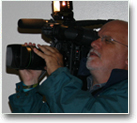 United Nations Environment Programme (UNEP) Report Features Contributions of Trent University ResearcherFOR IMMEDIATE RELEASE Prof. Raul Ponce-Hernandez Lead Author of Lands Chapter in Global Environmental Outlook (GEO) Report Released Today in 40 Cities World-Wide Thursday, October 25, 2007, Peterborough
A new groundbreaking Global Environmental Outlook (GEO) report coordinated by the United Nations Environment Programme (UNEP) and released today to great international fanfare in 40 cities across the world from Ottawa to Peru, features the contributions of Trent University professor Dr. Raul Ponce-Hernandez as a lead author of one of the report’s ten chapters. The GEO-4 report, the fourth in a series compiled by the UNEP, examines the role and impact of the state of the environment on human well-being as well as the use of environmental assessment and valuation as a decision-making tool. “The report is a comprehensive and authoritative assessment on the status of the planet, derived from a monumental effort by the science and environmental policy community,” Prof. Ponce-Hernandez explains. “It is a landmark report that highlights emerging environmental issues that require policy attention and makes recommendations for decision-makers to act. It is also part of the United Nations Environment Programme’s core mandate to keep the global environment periodically under review.” In the report, the UNEP says major threats to the planet such as climate change, the rate of extinction of species, and the challenge of feeding a growing population are among the many that remain unresolved, and all of them put humanity at risk. GEO-4 also assesses the current state of the global atmosphere, land, water and biodiversity, describing the changes since 1987, and identifies priorities for action. GEO-4 is the most comprehensive UN report on the environment, prepared by about 390 experts and reviewed by more than 1,000 others across the world. Contributing to the GEO publication for the UNEP is the latest project in a relatively long research relationship between Prof. Ponce-Hernandez and UN agencies. In 1996 he led a team in crafting the methodology for the “Economic and Ecologic Zoning” of the Amazon Basin, following which he was engaged by the Food and Agriculture Organization (FAO) of the UN for researching methods and developing modelling tools for the assessment of carbon sequestration in agricultural and forested lands in the developing world. In addition, in 2002 and 2004, as a visiting research scientist at the FAO headquarters in Rome, Prof. Ponce-Hernandez provided the main thrust in developing the methodology for the assessment of land degradation in drylands for the Global LADA project of FAO and UNEP; and in 2005 he adapted such methodology for the Middle East and conducted a pilot project with funding form the UN Economic and Social Program for West Asia (ESCWA) on the assessment of land degradation and the advance of desertification in the Bekaa Valley in Lebanon. As recently as this past summer, with support from the UN-ESCWA, he imparted two field training workshops on land degradation field methods and applied remote sensing in northern Lebanon and in the East Bank and central regions of Jordan. For his role in the GEO-4 Report, Prof.Ponce-Hernandez will be featured on the UNEP’s “Ask an Expert” web page on Monday, November 12. He will be online to address questions on the lands chapter of the report. For more information about the GEO-4 report released today and the Ask an Expert panel, please visit the UNEP web site at www.unep.org. -30- For more information, please contact: To facilitate an interview with Prof. Ponce-Hernandez for expert commentary on land use degradation, geomatics, and the use of computer spatial modelling of natural and human-induced processes, please contact Brittany Cadence, Communications Officer at (705) 748-1011, ext. 6185 or email brittanycadence@trentu.ca . |
































